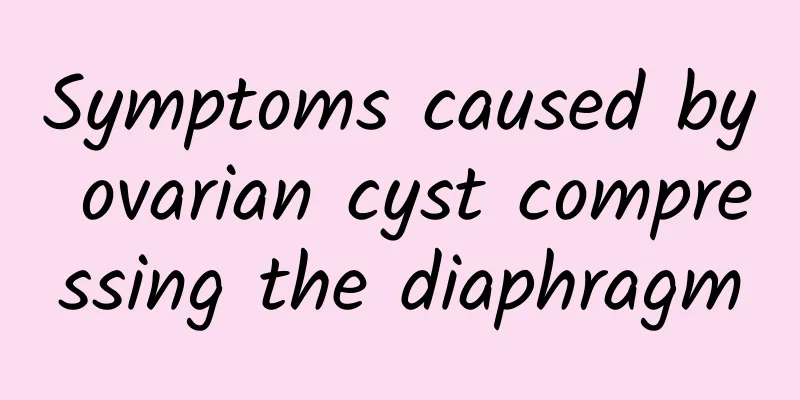What are the symptoms of miscarriage?

|
Pregnancy is a happy thing for women, but various miscarriages that occur during pregnancy are very devastating. Many female friends may not be very clear about the symptoms of miscarriage, so when signs of miscarriage appear, they fail to discover them and seek medical treatment in time, causing regret. The following editor will introduce you to the symptoms of miscarriage. Most miscarriages have a certain development process, although some stages are not obvious in clinical manifestations and may not develop in order. But generally speaking, they are nothing more than the following processes, namely clinical classification: threatened miscarriage, incomplete miscarriage, inevitable miscarriage and complete miscarriage. Different types of miscarriage have different symptoms: 1. Threatened abortion: refers to a small amount of vaginal bleeding before 28 weeks of pregnancy, followed by paroxysmal lower abdominal pain or back pain. Gynecological examination shows that the cervix is not open, the fetal membrane is not ruptured, the products of conception are not discharged, the size of the uterus is consistent with the number of weeks of amenorrhea, and there is hope for the pregnancy to continue. After rest and treatment, if the bleeding stops and the lower abdominal pain disappears, the pregnancy can continue; if the amount of vaginal bleeding increases or the lower abdominal pain worsens, it may develop into inevitable abortion. 2. Incomplete abortion: refers to the situation where the products of pregnancy have been partially discharged from the body, but some of them remain in the uterine cavity, which is the result of an inevitable abortion. Since some products of pregnancy remain in the uterine cavity, the uterine contraction is affected, resulting in continuous uterine bleeding, and even hemorrhagic shock due to excessive bleeding. Gynecological examination shows that the cervix has been dilated, and blood is constantly flowing out of the cervix. Sometimes placental tissue can be seen blocking the cervix, or some products of pregnancy have been discharged into the vagina, but some remain in the uterine cavity. Generally, the uterus is smaller than the number of weeks of amenorrhea. 3. Inevitable miscarriage: refers to the miscarriage is inevitable. It develops from threatened miscarriage. At this time, the amount of vaginal bleeding increases, the paroxysmal lower abdominal pain worsens, or vaginal discharge (rupture of membranes) occurs. Gynecological examination shows that the cervix has been dilated, and sometimes embryonic tissue or fetal sac can be seen blocking the cervix. The size of the uterus is consistent with the number of weeks of amenorrhea or slightly smaller. 4. Complete abortion: refers to the complete discharge of the products of pregnancy, gradual cessation of vaginal bleeding, and gradual disappearance of abdominal pain. Gynecological examination shows that the cervix is closed and the uterus is close to normal size. For different women, the miscarriage they experience may be of different types due to different reasons. Women must not be careless after a miscarriage and judge the type of miscarriage by themselves. Only by going to a professional hospital for diagnosis in time can they get the right treatment to prevent the next miscarriage. |
<<: Diet and health care after miscarriage
>>: Principles of dietary supplementation after artificial abortion
Recommend
Convert fat into muscle and exercise first to improve basal metabolism
"I control my diet and even have an exercise...
Health killer: chronic cervicitis
Chronic cervicitis is often developed from acute ...
Early symptoms of cervical warts
Sexual diseases are now rampant and women are als...
Patients with ectopic pregnancy can often steam chicken with Chinese medicine after surgery
Patients with ectopic pregnancy must strengthen t...
Ovarian cysts are a type of ovarian cyst that is caused by a small amount of ovarian fluid.
Many people know about ovarian cysts and know tha...
Eat well and you will be less likely to gain weight? The answer is here...
Have you ever had a day like this... Early in the...
Patients should always pay attention to the care methods of cervical erosion
Now, the incidence of cervical erosion is rising,...
What treatments do you know for vaginitis?
What treatments do you know for vaginitis? What a...
Sudden unbearable itching in the lower body and abnormal vaginal discharge
Sudden unbearable itching and abnormal vaginal di...
How to care for uterine fibroids How to care for uterine fibroids
What should be paid attention to in postoperative...
How to prevent recurrence of ectopic pregnancy
According to statistics, 10%-15% of women who hav...
Two most effective methods of treating ovarian cysts
At present, the most effective methods for treati...
Brief introduction to the treatment of uterine adnexitis
With the advancement of medical technology, there...
The weather is too cold and you don’t want to exercise? If you want to help lose weight, rely on warm Hong Kong-style dried fruit water, which is sweet, refreshing and less burdensome
Using fruit can achieve three things at once: rep...
Don't forget to lose weight with these 5 fruits that are high in fiber and low in sugar to help your metabolism
Fruit has always been a good friend of people who...









